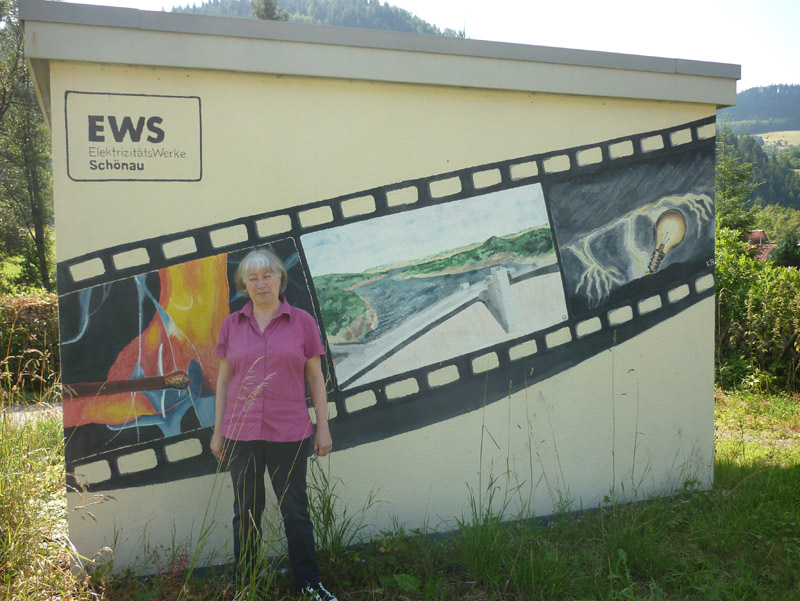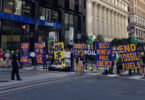This month’s issue of Resurgence Magazine features The Reluctant Rebels, an article I wrote based on my visit last summer with 2011 Goldman Environmental Prize Winner Ursula Sladek in the small town of Schönau in the Black Forest region of Germany. It’s quite a remarkable story of a small community taking matters into their own hands, and you can read the whole piece here, but if there’s one moment in their journey that not only goes to the root of many of the ecological problems the planet and its inhabitants face but offers a textbook example of what motivates a determined activist, it’s this one:
As it turned out, the Schönau energy rebels would need all that energy in overcoming their next, more formidable obstacle. “We went to KWR, the power company that was operating the local grid, and asked them whether they’d like to join our conservation efforts,” Ursula recalls. “We just wanted to add a few energy-saving measures, like rates based on consumption, and incentives for more cogeneration units, but they said, ‘Conserve energy? Have you lost your mind? We want to sell energy, not save it!’”
Here’s the Goldman Prize video in which Ursula describes the transformation from a group of concerned parents into a non-profit energy cooperative that provides power from over 1,800 solar, hydroelectric, wind, biomass and cogeneration facilities to 115,000 homes and businesses throughout the country:
[youtube http://www.youtube.com/watch?v=oz4XpBkR7tM]Also, Ode Magazine ran an article last month based on my visit with Peter Hasenbrink, pastor of the Schönau Lutheran church that became a legend when it covered its church roof in solar panels, calling them “Creation Windows” that provide “heavenly energy.”
I’ll be writing more about Schönau and its cast of energy rebels in the coming months, but for now some visual impressions of this giant little town from my trip this summer…




















Early today I was TRYING to write a piece about the Marcellus Shale natural gas industry and how it is poised to destroy rural Pennsylvania’s ecosystem (in the name of energy independence and job creation). I grappled for a call to action outside of “fight this today.” It’s absolutely invigorating to think that the public can bypass the “public” infrastructure. I wonder how Germany compares to the US in how that is done. If Ursula does write a how-to, my hope would be that it becomes a best seller.
My Marcellus Shale post will appear next week, but it sadly won’t have the inspirational news yours did. Please keep bringing us these stories so that we can continue to visualize a bright future.
And thanks for introducing me to Resurgence Magazine.
Ruth, I think there were many different pieces at play to make it happen. First of all, that horrible accident that functioned as a catalyst to wake people up. I’m not saying that is a prerequisite for action, but it is often something of that nature that gets us humans out of our routine and comfort zone. But then, after the initial shock had worn off and everyone else went back to business as usual, it took both individual persistence as well as a group of people coming together to work on a common goal. In some ways it also took a certain naivete, an almost childlike refusal to accept the world as it is, at least according to conventional wisdom. Indeed, nobody but Ursula and her friends believed that they could just start a power company, but they refused to be intimidated by this almost mythical faith we collectively have in the omnipotence of these corporate entities or other authorities, instead thinking, “well, KWR had to learn how to operate a power grid, so why can’t we?” There was ultimately a bit of luck and good timing involved, like the liberalization of the European electricity market and a growing shift toward embracing renewable energy, both among the German people and the government.
I think it can happen anywhere, including the US. In fact, it is already happening in places around the country, like Community Choice Aggregation, “a system adopted into law in the states of Massachusetts, Ohio, California, New Jersey and Rhode Island which allows cities and counties to aggregate the buying power of individual customers within a defined jurisdiction in order to secure alternative energy supply contracts.”
I haven’t heard about the Marcellus Shale and I look forward to reading your post about it. But as the recent development with the Keystone XL pipeline shows, it’s possible to stop certain damaging projects if enough people get behind it and find creative ways to make their voices heard. In my view, the creative aspects of activism are often underrated, but I think that being creative helps a lot in developing strategies that not only help in convincing others to do the right thing, but is essential in keeping your own morale and spirit intact for these difficult and often drawn out battles.
What a great and inspirational post! Just goes to show you what can happen if you don’t always take no for an answer.
Yes, patience and persistence are definitely important traits in change makers!